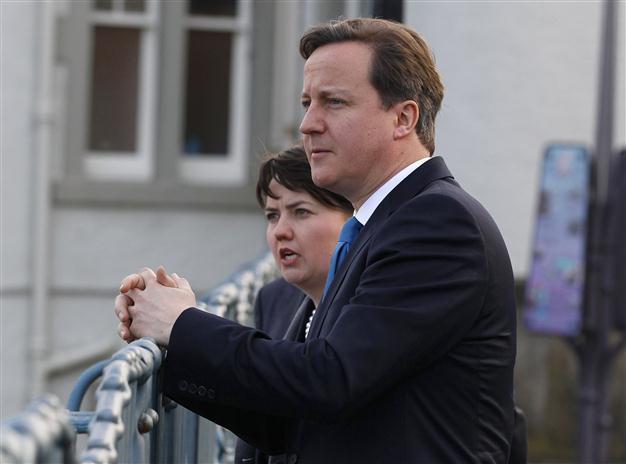UK's Cameron tells Scotland: Let's stay together
LONDON - The Associated Press

Britain's Prime Minister David Cameron (R) stands with Scottish Conservative Party leader Ruth Davidson at South Queensferry, in Scotland February 16, 2012. REUTERS Photo
England and Scotland work "so much better together" than apart, British Prime Minister David Cameron said today, as he appealed to Scots not to break up the United Kingdom by voting for independence.In a speech in Edinburgh ahead of talks on the ground rules for a referendum, Cameron said Britain was "a warm and stable home that billions elsewhere envy." "I believe in the United Kingdom," he said. "I'm a unionist, head, heart and soul.
"Of course Scotland could govern itself. So could England. But we do it so much better together." Later Thursday, Cameron was scheduled to hold his first meeting on the issue with Scottish leader Alex Salmond, whose separatist party has long campaigned for Scotland to leave its neighbors behind for the first time in more than 300 years.
Salmond is seeking to hold an independence referendum in September 2014, hoping that a separation from London would be completed with a May 2016 election for the Scottish Parliament.
However, with opinion polls showing that only about a third of Scots favor splitting the nation, Cameron and other opponents are pressing for the vote to be held earlier.
Salmond said negotiations on the details were making progress.
"We are moving toward areas of agreement," he told the BBC. "We're now agreed there shall be a referendum on Scottish independence, and what we're now doing is seeking to get agreement on what some of the ground rules for that referendum are." Scotland and England united in 1707 to form Great Britain, but Scotland gained significant autonomy after voting in 1997 to set up the Edinburgh-based Scottish Parliament, which has power over education, health and justice and can make minor alterations to income tax.
London retains primacy on all matters relating to Britain as a whole including defense, energy and foreign relations.
Cameron's government and Salmond are already at odds over the date of the referendum, what will be on the ballot paper and whether 16- and 17-year-olds should be entitled to vote.
In his Edinburgh speech, Cameron hinted that independence could damage Britain's status in Europe, within NATO and put at risk the U.K.'s permanent seat on the United Nations Security Council.
He said Scotland would be safer and richer if it remained a part of the U.K., along with England, Wales and Northern Ireland. Both Wales and Northern Ireland also have devolved administrations with limited powers.
But his overall tone was emollient. Cameron stressed that Scotland had the right to choose its own destiny, but said he hoped it would remain within Britain.
"Think of the key challenges of our times," Cameron said. "There's the risks and opportunities of globalization — with populations moving, cultures clashing and new routes to prosperity.
"And there's the impact of increasing economic competition from the new, economic powerhouses of the world.
"I believe the United Kingdom has the answers to both those challenges.
"Nothing encapsulates the principle of pooling risk, sharing resources and standing together with your neighbor better than the United Kingdom," he said.
He also suggested Scotland could be granted more powers within the U.K. if it rejected independence.
"We have to settle that question before going on and asking, quite legitimately, is there more we can do to improve the devolved settlement?" he said. "Are there other powers that can be devolved? How can we make the United Kingdom work better?" Salmond insists that independence would bring greater prosperity, allowing Scotland to better exploit its oil, gas and other energy resources.
And he was skeptical of Cameron's suggestion that rejecting independence would bring more powers for Scotland.
"If the prime minister has an offer to make to the people of Scotland then he should make it now," Salmond said. "He should spell it out now so we can have a clear debate and a clear decision on the alternative futures for Scotland.
"This idea of saying 'well, vote No and we'll give you something later' I don't think is going to convince anyone in Scotland and I think the prime minister, as a new tactic just adopted this morning, is on very shaky ground if he believes people in Scotland will be fooled again."
















